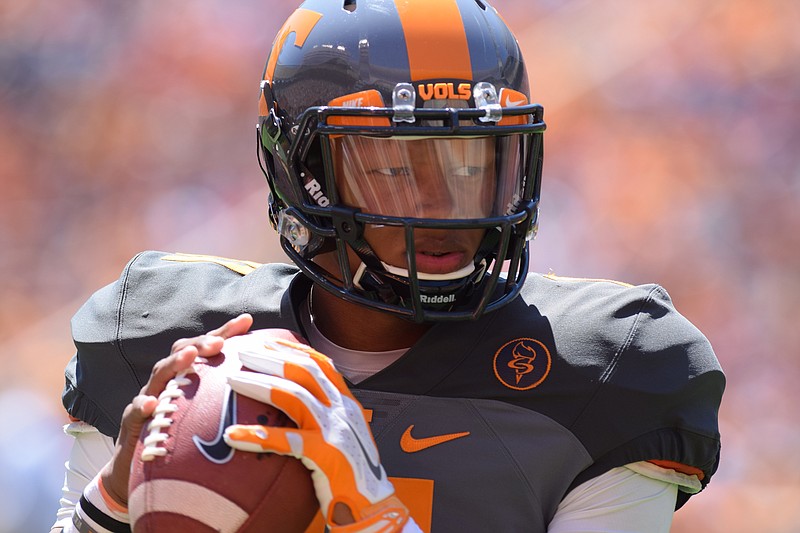KNOXVILLE - During the first half of the season Tennessee had a feast-or-famine offense.
In the first seven games it always seemed like the Volunteers either were going up and down the field and putting up points in bunches or shooting themselves in the feet with turnovers, dropped passes, penalties, sacks and more mistakes.
After a miserable performance on offense against Alabama, 18th-ranked Tennessee had an extra week to review what's worked, what hasn't and what needs to change for the final stretch of the season, which begins tonight at South Carolina.
"We went back and looked at tendencies by formations, and we've got to correct some of those things tendency-wise, which we're going to do," offensive coordinator Mike DeBord said. "I think the biggest thing is that when we have our guys and we're going, if we execute, we're hard to defend. We've really concentrated this week just on the execution part.
"Catching the ball and not dropping balls, not fumbling the ball, chinning the football and taking care of it that way - we've really worked on the execution part of it, and I feel like when we play fast, that's an added tool for us, because of the wear-down factor. We've done that in the second half. You've seen us have stronger second halves."
Tennessee's strongest offensive performances this season, as has been the case since Josh Dobbs took over as the starter against the Gamecocks two seasons ago, came when its running quarterback was, well, running successfully.
In four games in which Dobbs ran for at least 57 yards - he averaged 75.5 against Virginia Tech, Florida, Ohio and Texas A&M - the Vols averaged 479 yards and 37.3 points. In the other three games Dobbs finished with 26, minus-4 and minus-31 rushing yards and the Vols averaged only 280 yards and 21.3 points.
Beyond designed quarterback runs, most of Dobbs' carries come in Tennessee's zone-read schemes, and DeBord said the decision his quarterback has to keep the ball or hand it off is harder than it looks.
"That's always easier to do when you've got the clicker in your hand," he explained, "and you're slowing it down and going, 'I think I'd have kept it.' Well, yeah, you thought you might have. Everybody wants to see him run the ball, right? There's times that he'll say, 'I thought this' or 'I thought that.'
"It's a quick decision. Think about it. He catches the ball, he puts it there and he's got to make that fast decision right then. You're not going to be perfect. There's been times that, yeah, he says, 'I wish I would have kept the ball here.' There's other times, when he kept it, he says, 'I wish I would have given the ball here.'
"It's not a perfect thing, but it's one you're just continuing to give him reps with and perfect it as much as you can. But it's a quick decision. I don't even know if he's got one second to make that decision. It's catch, read, gone or give."
Defenses are devising schemes and adjusting them to force Dobbs into indecision and contain him, and the Vols' offensive line has struggled with odd-man fronts, when a defense puts five players on the line of scrimmage.
Those fronts affect the blocking combinations for Tennessee and create more one-on-one matchups, and often losing just one of them causes a play to fail.
"The defensive ends are all playing different techniques," DeBord explained. "Some of them will come across and hold. Some of them will feather down and then come back out. We got it last year against Missouri, but we're getting what we call a mesh charge where they're not reading anything and they're coming hard up the field. You're getting a lot of different reads.
"Before defenses would just say, 'Hey, we'll play it this way.' Well, then they got burnt by it. Now they're saying how can we slow it down. They're trying to stay with us with the play and say, 'Let's give him some indecision.' Teams change it up week to week. They don't always play it the same. You'll see it on film and you'll say he'll keep the ball a lot this week.
"Well, they get in the game and they've changed up their ends' techniques and stuff like that. We've faced a lot of that this year. Earlier in the year, we faced, which we didn't see on film, defensive ends coming straight up the field. Not coming at an angle, but straight up the field, trying to box everything inside. That obviously doesn't allow him to run, either."
Contact Patrick Brown at pbrown@timesfreepress.com.
